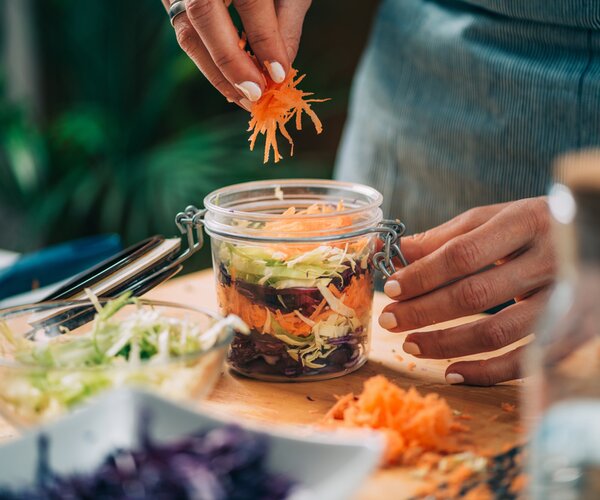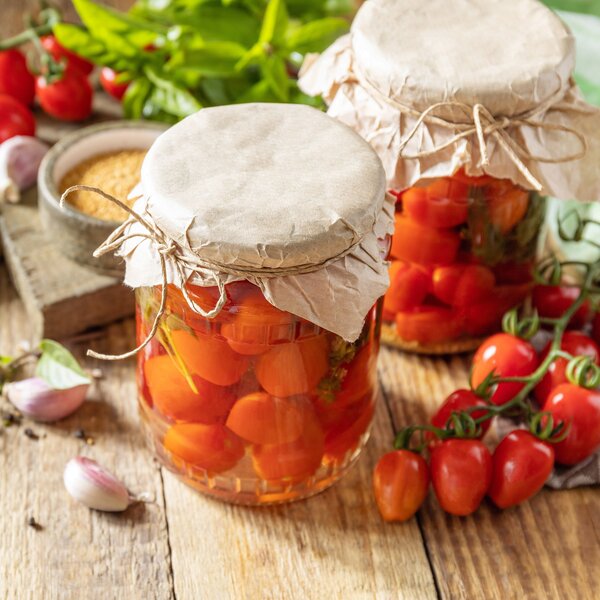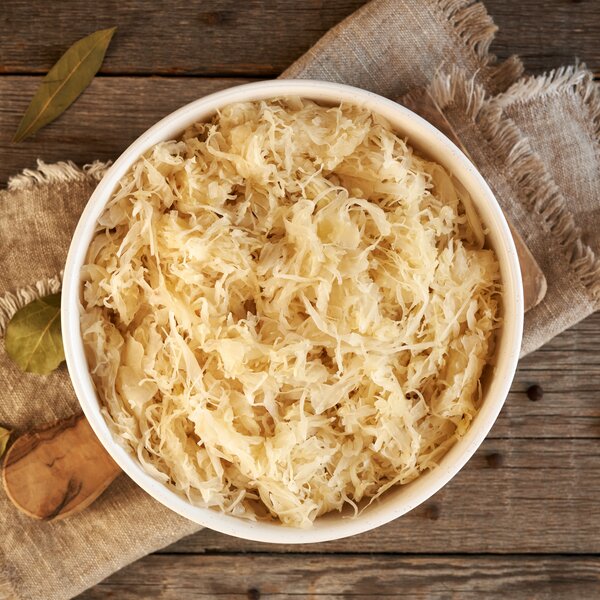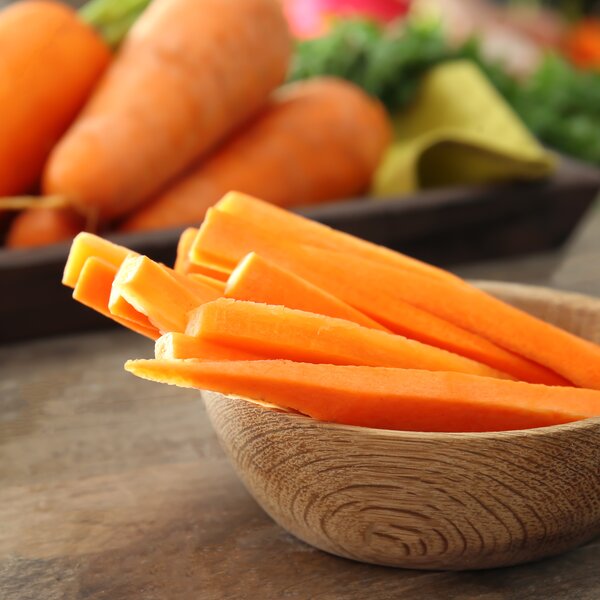
Multi-knowledge: Fermenting vegetables – simple and straightforward
Fermenting vegetables is becoming increasingly popular. No wonder – this traditional method not only preserves fresh vegetables for a long time, but also enhances their health benefits. Although the fermentation process may seem complex at first glance, it is quite easy to get started with just a few ingredients and a little patience.

What does fermentation mean?
Fermentation is a natural process in which microorganisms – mainly lactic acid bacteria – convert sugar and starch into lactic acid, gases or alcohol. In vegetable fermentation, the main focus is on the formation of lactic acid. This gives the vegetables their sour taste and also acts as a preservative. Fermented vegetables are not only characterised by their distinctive taste, but also by their improved nutrient density and digestibility.
Health benefits of fermented vegetables
Fermented vegetables contain probiotics – living microorganisms that promote the diversity of good bacteria in the gut. In addition to the positive effect on the gut microbiome, fermenting vegetables has many other health benefits:
1. Better digestion: Fermented vegetables contain enzymes that help digest food better. The probiotics in these foods also improve intestinal motility and contribute to healthy digestion.
2. Increased nutrient absorption: Fermentation makes nutrients in vegetables more bioavailable. Vitamin C, B vitamins and minerals such as iron and magnesium are more easily absorbed by the body through the fermentation process.
1. Better digestion: Fermented vegetables contain enzymes that help digest food better. The probiotics in these foods also improve intestinal motility and contribute to healthy digestion.
2. Increased nutrient absorption: Fermentation makes nutrients in vegetables more bioavailable. Vitamin C, B vitamins and minerals such as iron and magnesium are more easily absorbed by the body through the fermentation process.
3. Strengthening the immune system: A healthy microbiome is closely linked to a strong immune system. Eating fermented foods such as sauerkraut or kimchi can strengthen the immune system.
4. Supporting mental health: Recent research suggests that the microbiome has a direct influence on the brain and our mood. A healthy microbiome can therefore help alleviate anxiety, stress and even depression.
3. Strengthening the immune system: A healthy microbiome is closely linked to a strong immune system. Eating fermented foods such as sauerkraut or kimchi can strengthen the immune system.
4. Supporting mental health: Recent research suggests that the microbiome has a direct influence on the brain and our mood. A healthy microbiome can therefore help alleviate anxiety, stress and even depression.
The basics: What you need for fermenting
Ingredients:
- Fresh vegetables: White cabbage, carrots, kohlrabi and celery are particularly suitable for beginners – they are easy to prepare and ferment reliably.
- High-quality salt: Salt is the second main ingredient for fermentation. It ensures that the bacteria grow, which convert the vegetables into the desired probiotic cultures. Iodised salt can interfere with fermentation, so it is best to use good rock salt or Manju sea salt.
- Water: Good, fresh tap water – nothing more needs to be added.
Accessories:
- Preserving jars: Classic Weck or Rex jars with rubber seals and swing tops are ideal. Special fermentation containers are not essential.
- Leaves for covering: Grape, raspberry or blackberry leaves prevent the vegetables from rising to the surface.
- Weights: Clean, boiled granite stones or special glass weights ensure that the vegetables remain under the brine.


Simple recipe for beginners: Classic sauerkraut
Sauerkraut is one of the simplest and most popular fermented vegetables and is ideal for beginners. It requires only a few ingredients and is easy to prepare.
Ingredients:
- 1 medium-sized white cabbage (preferably fresh and home-grown)
- 1 teaspoon caraway seeds and juniper berries (optional)
- 1-2 tablespoons Manju sea salt (per 1 kg of cabbage)
Preparation:
- Cut or slice the cabbage into thin strips.
- Place in a large bowl, add salt and spices.
- Knead vigorously with your hands until the cabbage softens and releases juice. This juice is important as it keeps the vegetables under the brine during fermentation.
- Place the cabbage in a 1-litre jar. Important: press the vegetables down firmly so that the juice covers them completely.
- Cover with vine, raspberry or blackberry leaves and cover with boiled, cooled stones.
- Seal the jar with the rubber seal to make it airtight and place in a warm place (18–22°C) out of direct sunlight. Leave to ferment for 5–7 days. Ideally, place the jar on a tray as liquid may leak out.
- The brine will be slightly cloudy at first and then become clear again. Check regularly to make sure the cabbage remains submerged in the brine.
- Try it after a few days – the longer it ferments, the more sour it becomes!
- Once the desired flavour has been achieved, store in the refrigerator or a cool cellar.
Even easier: fermented carrot sticks
An ideal beginner's project – quick to prepare and mild in flavour.
Ingredients:
- 500 g carrots
- 1 teaspoon Manju sea salt
- 500 ml water
Preparation:
- Peel the carrots and cut them into sticks.
- Mix the water and salt in a glass until the salt has completely dissolved.
- Layer the carrots vertically in a 1-litre preserving jar.
- Cover with grape, raspberry or blackberry leaves and weigh down with boiled, cooled stones.
- Pour the brine into the preserving jar and make sure that the vegetables are completely covered by the brine.
- Seal the jar with the rubber seal to make it airtight and leave to ferment at room temperature for 3-5 days. The longer the fermentation, the more sour and intense the carrots will become.
- Once the desired flavour has been achieved, store in a cool place.

Patience is key
The most important thing when fermenting: patience! You may not notice much in the first few days, but over time the natural bacteria will become active and begin to ferment the vegetables. Temperature plays a role here: fermentation is faster at warm temperatures and slower at cooler temperatures.
Further tips for getting started:
Start with small quantities: a small jar of sauerkraut or fermented carrots is enough to gain initial experience and observe the process.
Pay attention to cleanliness: jars, tools and hands should be clean. Dirt can introduce unwanted bacteria.
Tasting is important: Taste and texture change during fermentation. Taste fermented vegetables regularly to find the right moment.
Recommended reading:
Andrea Bierwolf – ‘Fermentista’
A recommended book for anyone who wants to delve deeper into the subject.
The most important thing when fermenting: patience! You may not notice much in the first few days, but over time the natural bacteria will become active and begin to ferment the vegetables. Temperature plays a role here: fermentation is faster at warm temperatures and slower at cooler temperatures.
Further tips for getting started:
Start with small quantities: a small jar of sauerkraut or fermented carrots is enough to gain initial experience and observe the process.
Pay attention to cleanliness: jars, tools and hands should be clean. Dirt can introduce unwanted bacteria.
Tasting is important: Taste and texture change during fermentation. Taste fermented vegetables regularly to find the right moment.
Recommended reading:
Andrea Bierwolf – ‘Fermentista’
A recommended book for anyone who wants to delve deeper into the subject.
Multi-knowledge – Barbara's effective tips for every home
Discover the best advice from our expert Barbara Enengel for a sustainable home and a flourishing garden in our blog series ‘Multi-knowledge – Barbara's effective tips for every home’. Whether it's about cleaning your living space ecologically or transforming your garden into a blooming oasis, Barbara's tips will enrich your everyday life. Stay tuned for inspiring stories and smart life hacks! Barbara Enengel studied agriculture at the University of Natural Resources and Life Sciences in Vienna. She is interested in natural cycles and ecological relationships in nature and in the garden. She is particularly passionate about creating a diverse and healthy habitat for humans, animals and plants, a principle she enthusiastically puts into practice in her beautifully landscaped and ecologically managed garden.



